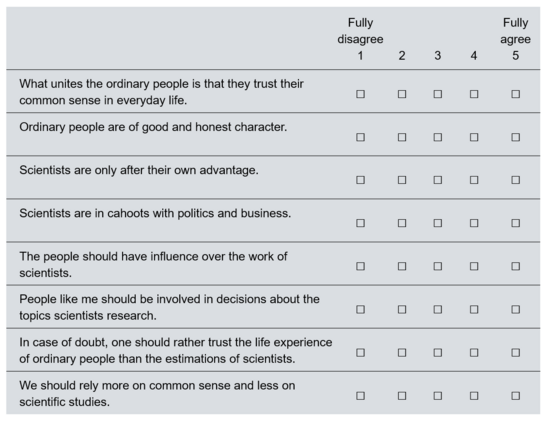Niels Mede · @nielsmede
481 followers · 100 posts · Server fediscience.orgSo I seek to promote an #OpenScience culture within #CommunicationStudies by sharing code and publishing #OpenAccess – and conducting research on #reproduciblity and #replication, yet from a #SocialScience perspective: @mss7676 @riziegler@twitter.com @m_weisskopf@twitter.com and I analyzed German survey data to examine public perceptions of the #ReplicationCrisis: https://doi.org/10.1177/0963662520954370
10/11
#mypublications #replicationcrisis #socialscience #replication #reproduciblity #openaccess #communicationstudies #OpenScience
Niels Mede · @nielsmede
481 followers · 100 posts · Server fediscience.org📚 Systematischer Review der Forschung zu Wirkungen digitaler #Wissenschaftskommunikation: https://www.bbaw.de/files-bbaw/user_upload/publikationen/Broschuere-WiD_17_PDF-A1b.pdf#page=39
🏆Theorie-/Review-Aufsatz zur Frage, was «gute» und «kritikwürdige» Wissenschaftskommunikation ist: https://www.nielsmede.com/publication/mede-schaefer-2020b/chapter.pdf
🤝 Gastbeitrag bei @wissenschaftimdialog wissenschaftskommunikation.de zu Chancen und Herausforderungen partizipativer Wissenschaftskommunikation: https://www.wissenschaftskommunikation.de/partizipative-wissenschaftskommunikation-promises-and-pitfalls-56581/
8/11
#mypublications #wissenschaftskommunikation
Niels Mede · @nielsmede
481 followers · 100 posts · Server fediscience.org👀 Eye-tracking study analyzing how #Wikipedia users search for information on #CRISPR: https://doi.org/10.1080/17524032.2020.172366
🌍 Global survey on critical science attitudes and media use: https://www.nature.com/articles/s41599-022-01058-y
🇩🇪 Four surveys showing how the #pandemic affected German’s trust in science: https://doi.org/10.1371/journal.pone.0262823
🧮 Segmentation analysis of Swiss science communication audiences: https://doi.org/10.1177/09636625211057379
☄️ Commentary on #Netflix’ “Don’t Look Up”: https://doi.org/10.22323/2.21050305
7/11
#mypublications #netflix #pandemic #crispr #wikipedia
Niels Mede · @nielsmede
481 followers · 100 posts · Server fediscience.orgI teamed up w/ @mss7676 @j_metag and @KlingerKira@twitter.com (to name only some) and used the SciPop Scale in further surveys:
🦠 SciPop declined in #Switzerland after the pandemic started: https://doi.org/10.1177/09636625211056871
🤨 SciPop correlates with low #trust in science: https://doi.org/10.3389/fcomm.2021.822757
🔗 SciPop links to less science knowledge and opposition to left-leaning views: https://doi.org/10.1371/journal.pone.0271204
6/11
#mypublications #trust #switzerland
Niels Mede · @nielsmede
481 followers · 100 posts · Server fediscience.orgWe developed a #survey scale for this: We reviewed existing #research, selected items useful to measure the four components of our concept – and added new items 🔧
Then we tested these items in two representative surveys in #Switzerland. Analyses led us to 8 items measuring science-related populist attitudes (the “SciPop Scale”, see image) 📏
More details in our paper: https://academic.oup.com/ijpor/article/33/2/273/6029621
5/11
#mypublications #switzerland #research #survey
Niels Mede · @nielsmede
481 followers · 100 posts · Server fediscience.orgTogether w/ @mss7676 I conceptualized science-related populism as a set of ideas claiming that “ordinary people” and common sense are superior to academic elites and allegedly useless scientific knowledge 😠
So science-related populism suggests that #scientists and #experts have illegitimate power to determine “true knowledge” – as such power should be with the people 💢
We published this concept #OpenAccess here: https://journals.sagepub.com/doi/10.1177/0963662520924259 #MyPublications
4/11
#mypublications #openaccess #experts #scientists
